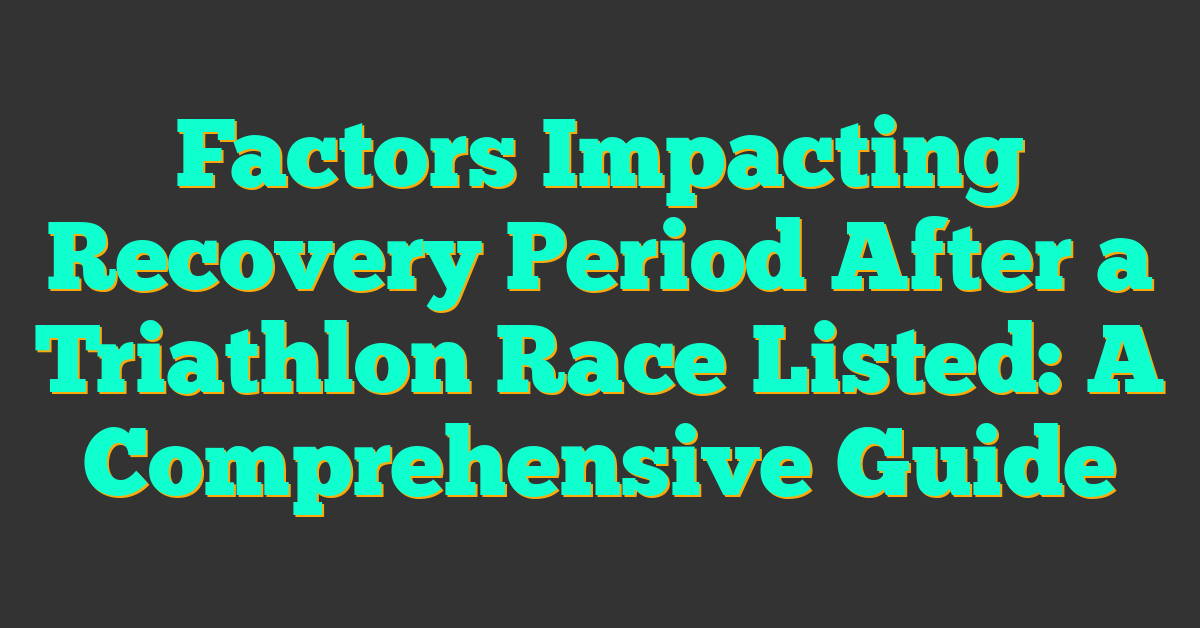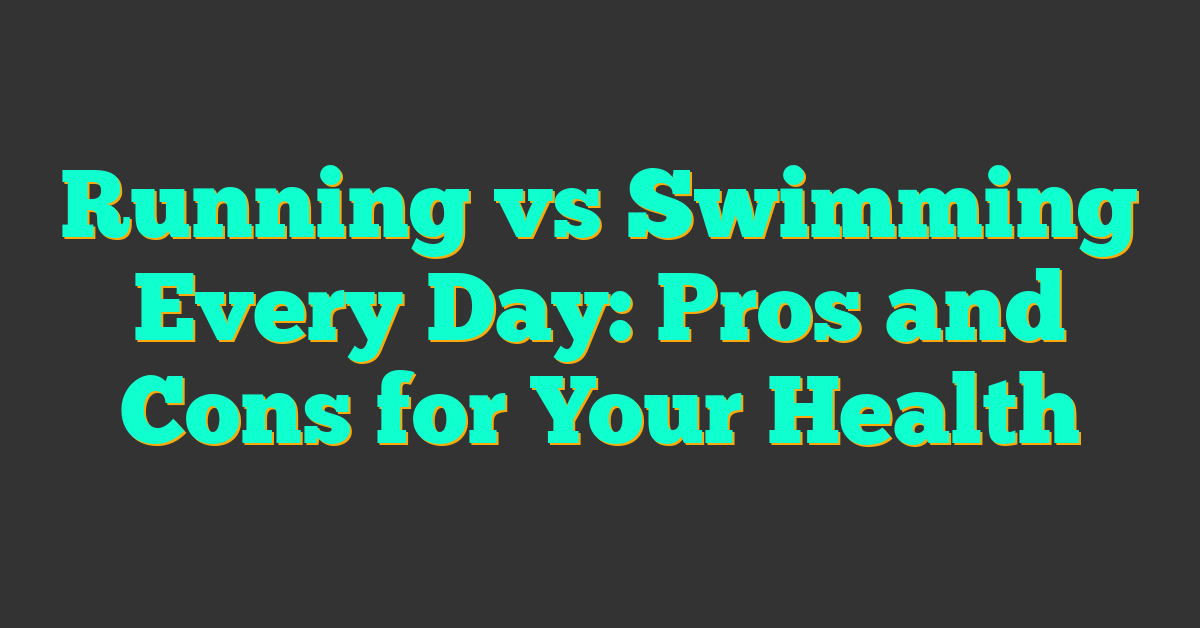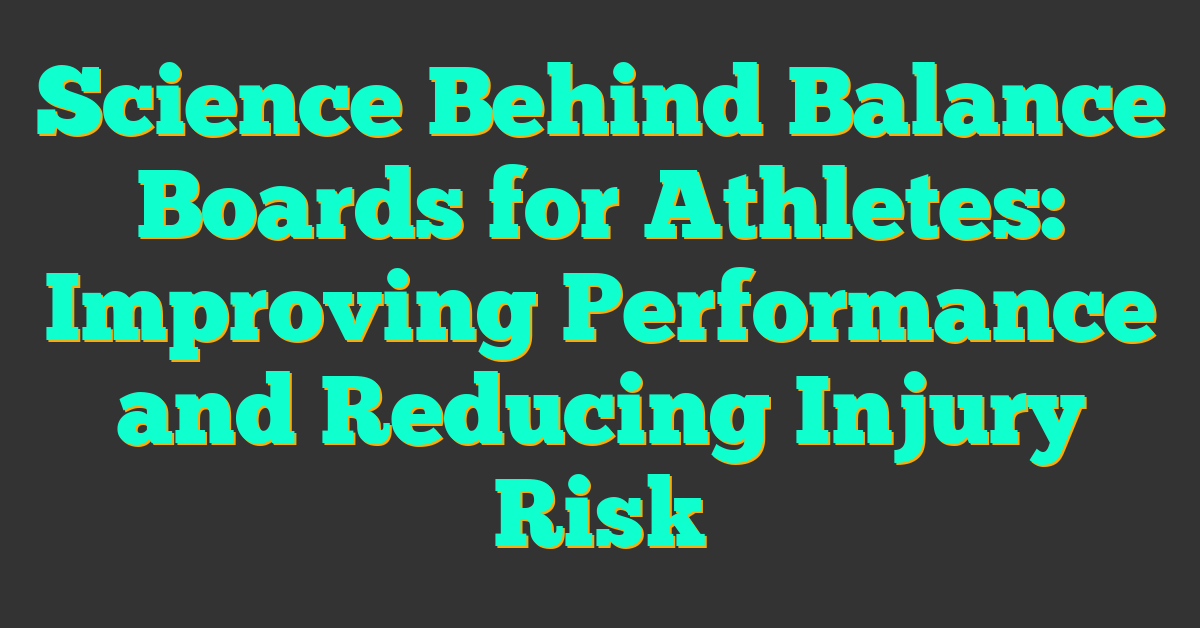If you’re a triathlete, you know that recovery is just as important as training. After a triathlon race, your body needs time to recover from the physical, mental, and emotional stress of the event. The length of your recovery period will depend on several factors, including the length of the race, your fitness level, and the intensity of your training leading up to the event.

Understanding the factors that impact your recovery period can help you plan your training and recovery strategies more effectively. In this article, we’ll explore the different factors that can affect your recovery after a triathlon race. We’ll cover nutrition and hydration, physical recovery techniques, active recovery and exercise, and mental and emotional recovery. We’ll also answer some frequently asked questions about triathlon recovery.
Key Takeaways
- Proper nutrition and hydration can speed up your recovery after a triathlon race.
- Physical recovery techniques like massage and stretching can help reduce muscle soreness and fatigue.
- Active recovery and exercise can help improve circulation and promote healing after a triathlon race.
Understanding Triathlon Recovery
https://www.youtube.com/watch?v=jwv-gh6P6Ds&embed=true

Completing a triathlon is a significant accomplishment, but it also requires a significant amount of physical exertion. Triathletes often experience fatigue and muscle soreness after completing a race, which can impact their training and performance. Understanding the phases of triathlon recovery and the factors that impact recovery time can help you optimize your training and ensure that you are able to perform at your best.
Phases of Recovery
Triathlon recovery can be broken down into three phases: immediate recovery, short-term recovery, and long-term recovery.
Immediate Recovery: This phase typically lasts for the first 30 minutes after completing a race. During this time, it is important to consume a combination of protein and carbohydrates to replenish glycogen stores and repair muscle tissue. ACTIVE recommends consuming 15-25 grams of protein and 40-50 grams of carbohydrates within the first half hour after completing your race.
Short-term Recovery: This phase typically lasts for the first 48-72 hours after completing a race. During this time, it is important to engage in active recovery, such as light exercise, stretching, and foam rolling. Active recovery can help increase blood flow to the muscles, which can aid in the removal of metabolic waste and reduce inflammation.
Long-term Recovery: This phase can last for several weeks after completing a race. During this time, it is important to gradually increase your training volume and intensity to avoid injury and allow your body to fully recover.
Recovery Time Factors
Several factors can impact your triathlon recovery time, including:
Race Distance: The length of the race can impact your recovery time. Longer races, such as Ironman triathlons, require a longer recovery period than shorter races, such as sprints.
Training Volume and Intensity: The amount and intensity of your training leading up to the race can impact your recovery time. Overtraining can lead to fatigue and increase your risk of injury.
Nutrition: Proper nutrition is essential for optimal recovery. Consuming a balanced diet that includes plenty of protein and carbohydrates can help replenish glycogen stores and repair muscle tissue.
Sleep: Getting adequate sleep is essential for recovery. During sleep, your body repairs and regenerates tissues, which can aid in recovery.
Age and Fitness Level: Age and fitness level can impact recovery time. Older athletes may require a longer recovery period than younger athletes, and less fit athletes may require a longer recovery period than more fit athletes.
By understanding the phases of triathlon recovery and the factors that impact recovery time, you can optimize your training and ensure that you are able to perform at your best.
Nutrition and Hydration
https://www.youtube.com/watch?v=plOjL5S9Nek&embed=true
Completing a triathlon is a great accomplishment, but it also puts enormous strain on your muscles, which require adequate recovery time. Proper nutrition and hydration are key to enhancing the recovery process and reducing the risk of injury. In this section, we’ll cover some essential tips for post-race nutrition, hydration strategies, and supplements that can help you recover quickly and effectively.
Post-Race Nutrition
After a triathlon race, your body needs to replenish the nutrients and energy it has lost during the event. Consuming a combination of carbohydrates and protein within 30 minutes of finishing the race can help start the recovery process. Carbohydrates provide your body with energy, while protein helps repair damaged muscle tissue. Good post-race food options include fruit, energy bars, and recovery drinks.
Hydration Strategies
Staying hydrated is crucial for optimal recovery after a triathlon race. Dehydration can lead to muscle cramps, headaches, and fatigue, which can prolong the recovery process. Aim to drink at least 16-20 ounces of fluid for every pound of body weight lost during the race. Sports drinks that contain electrolytes can help replace lost fluids and minerals. Coconut water is also a great option as it is rich in potassium, magnesium, and other electrolytes.
Supplements and Recovery
Supplements can help speed up the recovery process and reduce muscle soreness after a triathlon race. Antioxidants such as Vitamin C and E can help reduce inflammation and oxidative stress caused by intense exercise. Minerals such as magnesium and zinc can help reduce muscle cramps and aid in muscle recovery. You can get these nutrients from fruits, vegetables, and supplements.
In conclusion, proper nutrition and hydration are crucial for enhancing the recovery process after a triathlon race. Consuming a combination of carbohydrates and protein, staying hydrated, and taking supplements can help reduce muscle soreness, speed up recovery, and reduce the risk of injury. Remember to listen to your body and give it the rest it needs to fully recover.
Physical Recovery Techniques
https://www.youtube.com/watch?v=037jaCDnM8Y&embed=true
After a triathlon race, your body needs time to recover from the intense physical activity. Here are some physical recovery techniques that can help you recover faster:
Rest and Sleep
Rest and sleep are essential for your body to recover after a triathlon race. During sleep, your body repairs and regenerates tissues, including muscle tissue. Aim for 7-9 hours of sleep per night, and take naps during the day if you feel tired.
Massage and Foam Rolling
Massage and foam rolling can help reduce muscle soreness and improve circulation, which can aid in muscle recovery. You can use a foam roller to self-massage your muscles or get a professional massage.
Cold Therapy and Compression
Cold therapy, such as an ice bath or cold shower, can help reduce inflammation and muscle soreness. Compression socks or clothing can also help reduce inflammation and improve circulation. Wearing compression clothing during exercise can also help reduce muscle fatigue.
« Exercise Benefits for Promoting Addiction Recovery: A Friendly Guide
Fast Forward Seatpost for Triathlon: Is it Necessary? What You Need to Know »
It’s important to note that these physical recovery techniques are not a substitute for proper training and nutrition. Make sure to replenish electrolytes and eat a balanced diet that includes protein, carbohydrates, and healthy fats to aid in muscle recovery.
Active Recovery and Exercise

After a triathlon race, your body needs time to recover from the intense physical activity. Active recovery workouts can help you speed up the recovery process. These workouts are low-intensity activities that increase blood flow and help flush out lactic acid from your muscles.
Low-Intensity Activities
Walking is a great active recovery workout that you can do after a triathlon race. It is a low-impact exercise that can help improve blood flow, reduce muscle soreness, and prevent stiffness. Yoga is another excellent low-intensity activity that can help you recover after a triathlon race. It can help you stretch your muscles, reduce stress, and improve your flexibility.
Flexibility and Stretching Workouts
Stretching is an essential part of recovery after a triathlon race. It can help you improve your range of motion, reduce muscle soreness, and prevent injuries. Flexibility workouts such as stretching and yoga can help you recover faster after a triathlon race.
Aqua jogging is another low-impact exercise that can help you recover after a triathlon race. It is a great way to get your heart rate up without putting too much stress on your joints. Hiking is another excellent low-intensity activity that can help you recover after a triathlon race. It can help you improve your cardiovascular fitness, reduce stress, and enjoy the great outdoors.
In conclusion, active recovery workouts can help you recover faster after a triathlon race. Low-intensity activities such as walking, yoga, and hiking can help you improve blood flow, reduce muscle soreness, and prevent stiffness. Flexibility and stretching workouts can help you improve your range of motion, reduce muscle soreness, and prevent injuries.
Mental and Emotional Recovery

Recovery after a triathlon race is not just about physical rest and nutrition. Mental and emotional recovery is equally important to ensure that you are ready to get back to your training routine. Here are some factors that can help you with mental and emotional recovery.
Stress Management
Stress can have a significant impact on your recovery period after a triathlon race. High levels of cortisol, which is the body’s stress hormone, can interfere with your performance and prolong your recovery time. Therefore, it is essential to manage your stress levels to help your body recover faster.
One way to manage stress is to practice relaxation techniques such as meditation, deep breathing, or yoga. These techniques can help you relax and reduce your cortisol levels, allowing your body to recover faster. Additionally, listening to your body and taking rest days when needed can also help manage stress levels.
Celebrating Achievements
Celebrating your achievements after the race can also help with your mental and emotional recovery. Completing a triathlon is a significant accomplishment, and taking the time to celebrate can boost your mood and help you feel more motivated to continue with your training.
Celebrating doesn’t have to be extravagant; it can be as simple as treating yourself to a favorite meal, getting a massage, or spending time with friends and family. Celebrating your achievements can help you feel more positive and energized, which can aid in your recovery period.
In summary, mental and emotional recovery is an essential part of the recovery period after a triathlon race. Managing stress levels and celebrating your achievements can help you feel more positive and motivated, which can aid in your recovery period. Remember to listen to your body and take rest days when needed to help manage stress levels and allow your body to recover fully.
Frequently Asked Questions
https://www.youtube.com/watch?v=13Bjb2dsPxk&embed=true
What are effective post-race recovery strategies for triathletes?
Effective post-race recovery strategies for triathletes include cooling down, rehydrating, and refueling with a mix of carbohydrates and protein within 30 minutes of completing the race. You can achieve this ratio by consuming a recovery drink or snack such as a banana with peanut butter or a protein shake. Take 48-72 hours off to allow for full recovery. Then train in Zone 2 only (Easy or Steady) for up to two weeks. Keep moving if possible to not completely shut down.
How many rest days are recommended after completing a Half Ironman?
After completing a Half Ironman, it is recommended to take 10 to 14 days off to allow for full recovery. You can use this time to focus on low-intensity workouts such as walking, swimming, and biking.
What is the ideal nutrition plan to aid recovery following a triathlon?
The ideal nutrition plan to aid recovery following a triathlon is to refuel with a mix of carbohydrates and protein within 30 minutes of completing the race. Aim for a 3:1 or 4:1 ratio of carbohydrates to protein. You can achieve this ratio by consuming a recovery drink or snack such as a banana with peanut butter or a protein shake.
What are the best ways to prevent injuries in future triathlons?
The best ways to prevent injuries in future triathlons include proper training, stretching, and strengthening exercises. Make sure to listen to your body and take rest days when needed. Use proper equipment, such as a well-fitting bike helmet and comfortable running shoes.
How does the distance of a triathlon affect the recovery time needed?
The distance of a triathlon affects the recovery time needed. For example, a Sprint distance triathlon may require 2-3 days of rest and recovery, while an Ironman distance triathlon may require 2-3 weeks of rest and recovery.
What activities can help maintain fitness while recovering from a triathlon?
Activities that can help maintain fitness while recovering from a triathlon include low-intensity workouts such as walking, swimming, and biking. Yoga and stretching can also be beneficial in aiding recovery and maintaining flexibility.






![Lamicall Bike Frame Bag Waterproof - [1s Release] [2 in](https://m.media-amazon.com/images/I/41WyOmmNsYL._SL500_.jpg)



